Ceramic dental implants have become a popular alternative to traditional titanium implants due to their biocompatibility, aesthetic appeal, and metal-free composition. Patients seeking a more natural look often prefer ceramic implants, but one of the key concerns is the ceramic dental implants cost. In this article, we’ll explore the factors that influence the price, compare costs with titanium implants, and provide insights into how to calculate the cost of your dental implant treatment.
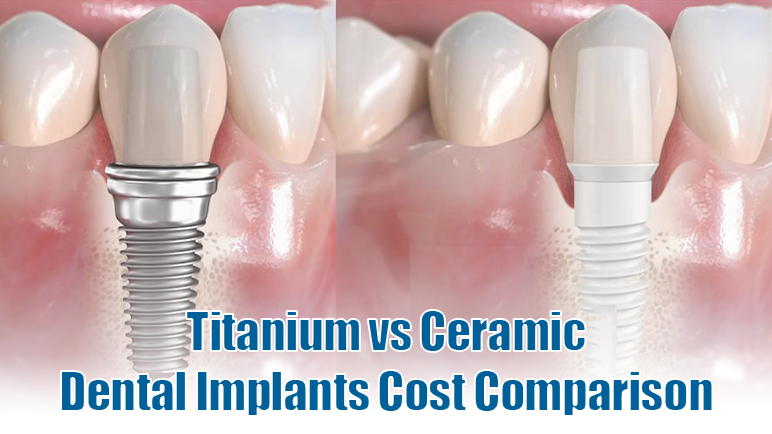
Factors Affecting Ceramic Dental Implants Cost
Ceramic tooth implant cost varies depending on several factors:
- Location of the Clinic: Prices can differ greatly between countries and even within regions. Clinics in major cities tend to have higher costs due to higher overheads.
- Dentist’s Expertise: The experience and specialization of the dentist can affect the price. Experts in ceramic implants may charge more for their services.
- Implant System: The brand and quality of the ceramic implant system being used are significant cost drivers. Premium implant systems ensure durability and higher success rates.
- Additional Procedures: Many patients require bone grafting or sinus lifts before implant placement, which can add to the overall cost.
How Much Are Zirconia Implants?
Ceramic dental implants, often made from zirconia, are typically more expensive than titanium implants. If you are wondering how much are zirconia implants, it’s essential to recognize that the cost ranges from $3,500 to $6,000 per implant in the U.S. This price generally includes the implant, abutment, and crown.
For patients requiring multiple implants, such as full-arch replacements, the zirconia full arch cost can be significantly higher. Full-arch restorations with zirconia implants may cost between $25,000 and $45,000, depending on individual factors like the number of implants required and the complexity of the case.
Comparing Zirconia Implants vs Titanium Cost
Comparing zirconia and titanium implants requires a comprehensive evaluation of factors such as material costs, surgical procedures, restorations, and long-term maintenance. This provides a clearer understanding of the overall costs associated with each implant type.
| Factors | Zirconia Implants | Titanium Implants |
| Implant Material Cost | Average from $3,000 to $4,500 per implant | Average from $1,500 to $3,000 per implant |
| Surgical and Placement Costs | Higher due to more complex technique, around $2,000 to $4,000 | Lower, from $1,500 to $3,500 |
| Pre-Surgical Treatment Costs | No significant difference, around $500 to $2,000 | No significant difference, around $500 to $2,000 |
| Restoration of Implant Cost | Zirconia full arch cost, from $1,200 to $2,500 | Metal or porcelain crown restoration, from $800 to $1,500 |
| Post-Surgical Care and Maintenance Costs | Higher, requiring more frequent check-ups, from $300 to $600/year | Lower, less maintenance, from $150 to $400/year |
| Replacement or Re-Treatment Costs | Higher, if damaged replacement can cost up to $2,000 | Lower, rarely needs replacement, from $500 to $1,500 |
| Technology and Equipment Costs | Requires advanced technology, from $1,000 to $3,000 | Lower technology costs, from $500 to $1,500 |
| Location and Market Factors | Higher in developed areas or premium clinics, around $4,000 to $6,000 per implant | More stable, from $3,000 to $5,000 per implant |
Need a cost-effective implant solution? Get a free consultation from our dentist today!
Dental Implant Cost Calculator
Navigating the landscape of dental implant pricing can be complex, but understanding how to leverage cost calculators and budgeting strategies can simplify the process.
Cost Estimation
Before committing to a particular dental implant solution, patients should undergo an initial consultation with their dentist. During this appointment, the dentist can assess individual needs, recommend suitable materials, and estimate overall costs.
Diagnostic tests, such as X-rays or CT scans, are often necessary to evaluate bone density and determine the best implant placement strategy. The costs associated with these diagnostic tests should be factored into the overall budget.

Additionally, the primary expense will arise from the surgical placement of the implant, which varies based on the number of implants and the complexity involved in the procedures. Overall, patients should anticipate that dental implant costs will encompass multiple components, such as abutment and crown fabrication.
Budgeting Tips
To approach the cost of ceramic dental implants effectively, consider the following budgeting tips:
- Consult Multiple Dentists: Seeking quotes from various dental professionals can provide insights into different pricing structures and treatment plans. Comparing costs and options allows for better decision-making.
- Discuss Payment Options: Many dental practices offer payment plans or financing options that enable patients to spread costs over time. Understanding these opportunities can ease financial stress.
- Explore Insurance Coverage: Carefully reviewing dental insurance policies can reveal potential coverage for implants. Knowing the extent of coverage upfront helps patients plan accordingly.
- Save Up for the Procedure: If insurance coverage is limited, proactively saving for dental implant expenses can provide peace of mind and ensure that funds are available when needed.
- Prioritize Dental Hygiene: Maintaining excellent oral hygiene can minimize future dental issues and reduce the likelihood of costly procedures down the line. A preventative approach to oral care pays dividends in the long run.
What Are Ceramic Dental Implants?
Ceramic dental implants are popular because they are biocompatible, look natural, and have a low risk of allergic reactions. These implants are made from zirconium dioxide (zirconia) or aluminum oxide (alumina). Knowing the differences between these two materials helps patients choose what works best for them.
Zirconia Implants
Zirconia implants are strong and durable, making them a top choice. They are well-tolerated by the body, which reduces the risk of allergies. People sensitive to metals, like titanium, often prefer zirconia implants. Their white color blends with natural teeth, creating a discreet appearance.
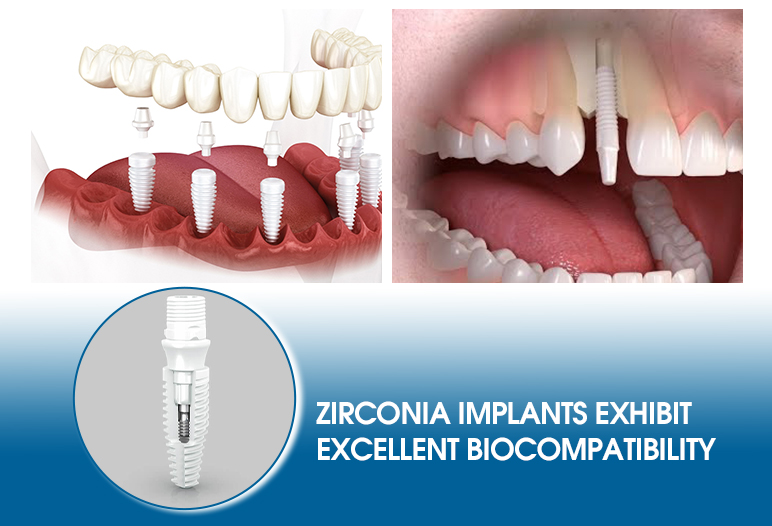
However, zirconia can break under high pressure, so it might not be suitable for people who grind their teeth. Also, placing zirconia implants can be tricky, requiring dentists with specific skills.
Alumina Implants
Alumina implants are another ceramic option, though less common. Like zirconia, they are biocompatible and resist corrosion. They also match the appearance of natural teeth well, making them ideal for front teeth.
Alumina, however, is not as strong as zirconia, limiting its use. This weakness increases the chance of fractures over time. Since alumina implants are less popular, they are harder to find in clinics.
Ceramic Dental Implants vs. Titanium Implants
| Category | Ceramic Dental Implants | Titanium Dental Implants |
| Material | Stand out for aesthetic benefits, especially in visible areas (Zirconia). | Known for strength and durability, bonds with the jawbone to form a stable base. |
| Biocompatibility and Allergies | Ideal for people allergic to metals. | Biocompatible for most people, though a small percentage may have allergic reactions. |
| Aesthetics | Resemble natural teeth due to white color. | May show through gums over time, especially if gums recede. |
| Strength and Durability | Strong but more fragile, can fracture under stress. | More durable, handles higher pressure, suitable for people with teeth-grinding habits. |
| Cost Consideration | Often more expensive due to the material and complexity of placement. | Generally less expensive. Patients need to weigh budget, health, and aesthetic needs. |
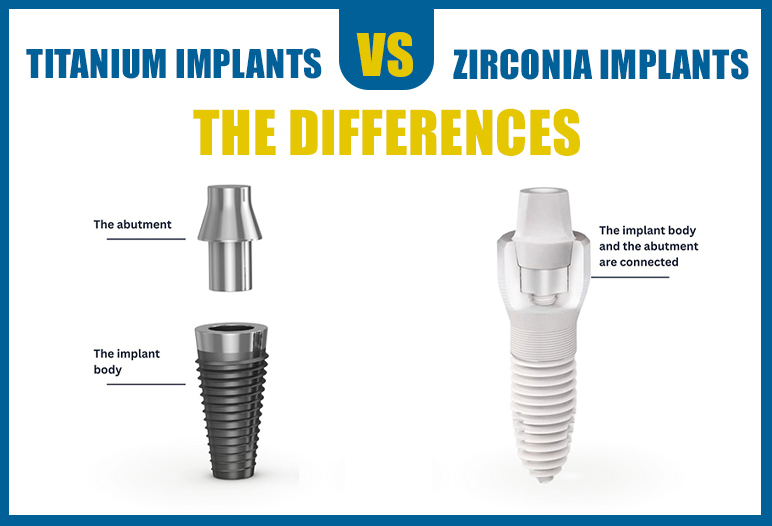
What to Consider When Choosing a Dental Implants Dentist?
Expertise and Training
Dentists at Saigon Dental Implants Center in Vietnam with more experience and advanced training in ceramic dental implants, especially zirconia, often charge higher fees. Their skill can lead to better results and fewer complications.
Coordinated Care
Opt for a dentist who can handle both the implant surgery and the restoration. This can lead to smoother treatment, better communication, and possibly lower costs, as you’re working with just one professional instead of coordinating between two specialists.
Specialization
Dentists who specialize in ceramic implants, like biological dentists who focus on zirconia, have a deep understanding of these specific implants. While their expertise may lead to better outcomes, it could also come with a higher price.
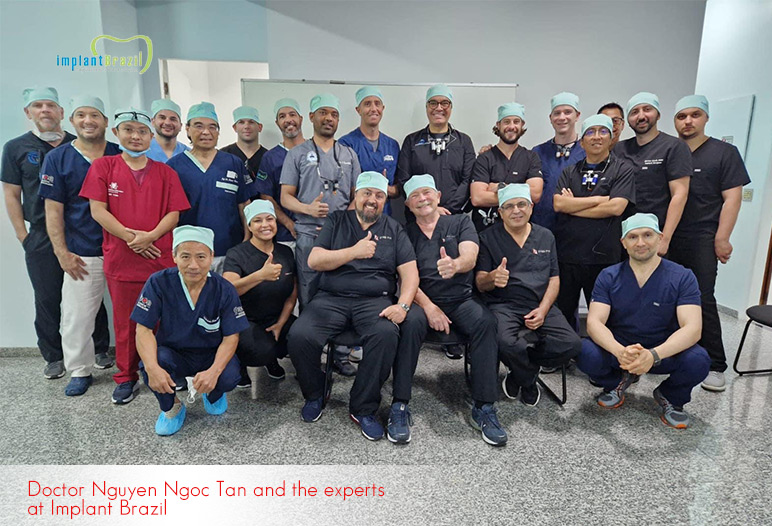
Quality and Success Rates
Dentists with a history of successful ceramic implant procedures can often justify their higher fees with proven success and satisfied patients. Many people are willing to pay more for a dentist known for quality results.
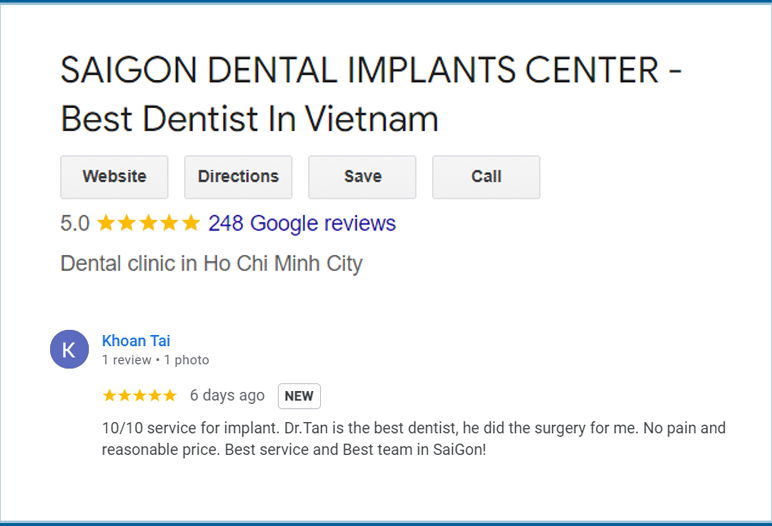
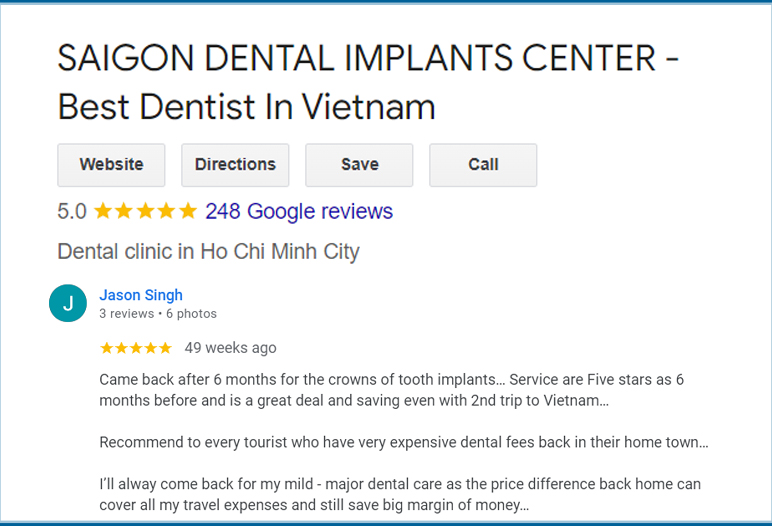
Successful treatment results

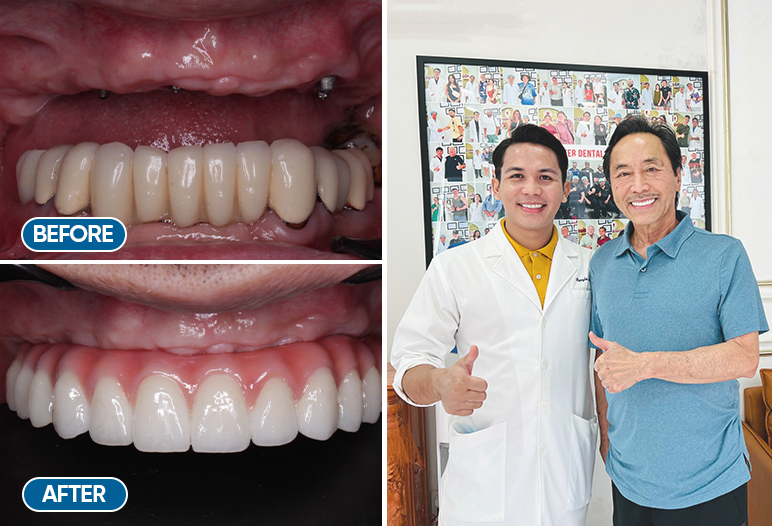
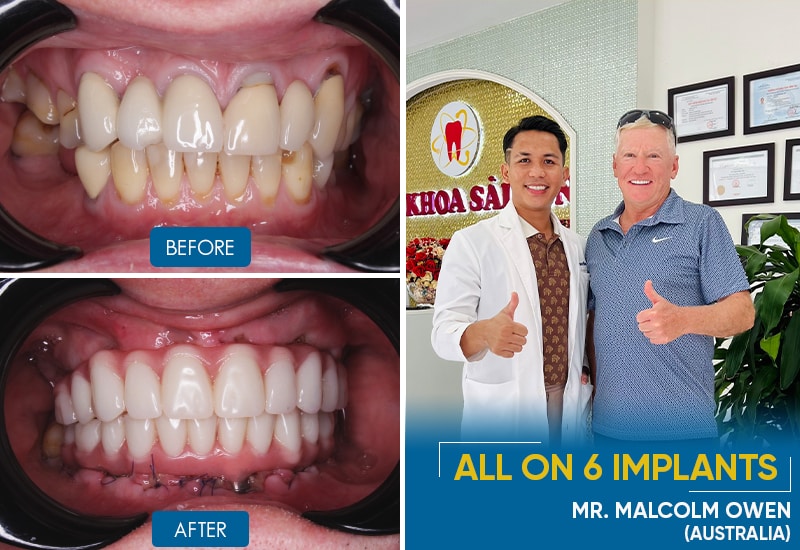

SAIGON IMPLANT CENTER – Dental Implant Specialist Vietnam
SAIGON IMPLANT CENTER – Dental Implant Specialist Vietnam
- Head Clinic: 119 Yersin, Pham Ngu Lao Ward, District 1, Ho Chi Minh City, Vietnam
- Branch Clinic: 378B Vo Van Tan, Ward 5, District 3, Ho Chi Minh City, Vietnam
- Hotline: (+84) 973 199 986
- Email: saigoncenterdental@gmail.com
- Website: saigonimplant.com
- Working Time: Mon – Sat: 08:00 – 18:00 | Sun: 08:00 – 16:00
Conclusion
Choosing between ceramic and titanium dental implants is a deeply personal decision informed by individual health needs, aesthetic preferences, and budgetary constraints. While titanium implants have long been recognized as the gold standard, ceramic options—particularly zirconia implants—are gaining traction due to their natural appearance and superior biocompatibility.
By understanding the distinctions between different implant types, recognizing the factors that affect costs, and applying strategic budgeting tips, patients can approach their dental restoration journey with confidence. Engaging in open dialogues with qualified dental professionals will further empower individuals to make informed choices tailored to their unique circumstances.
With careful consideration and expert guidance, reclaiming a healthy, radiant smile is well within reach.

 Google Reviews
Google Reviews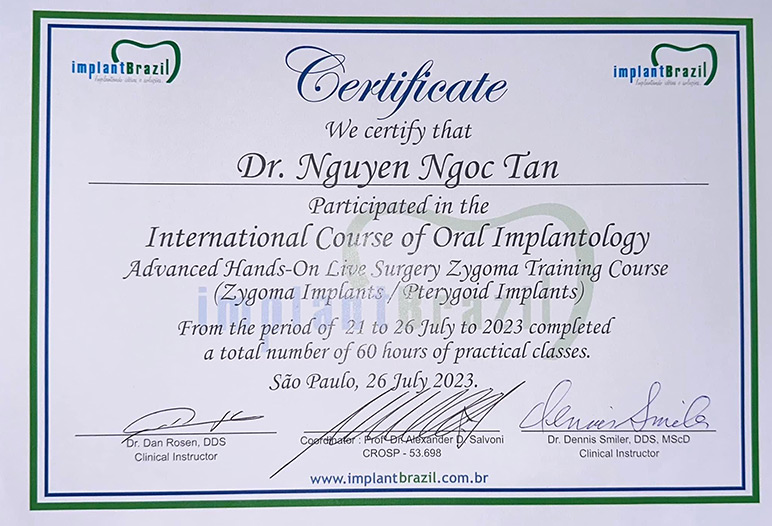


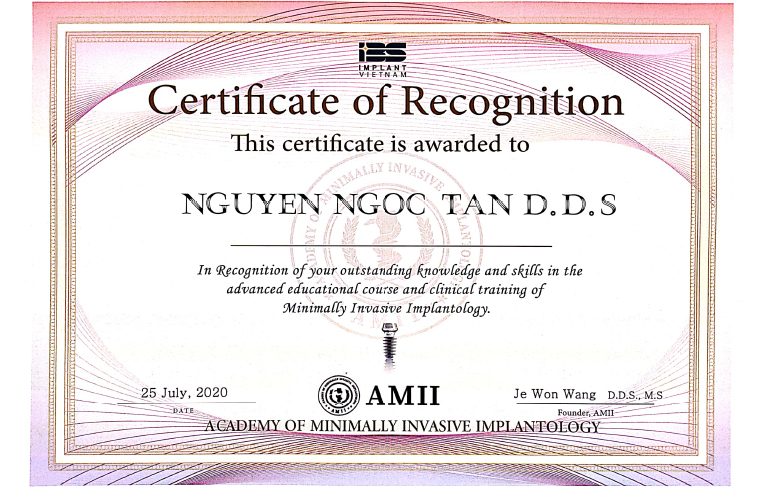
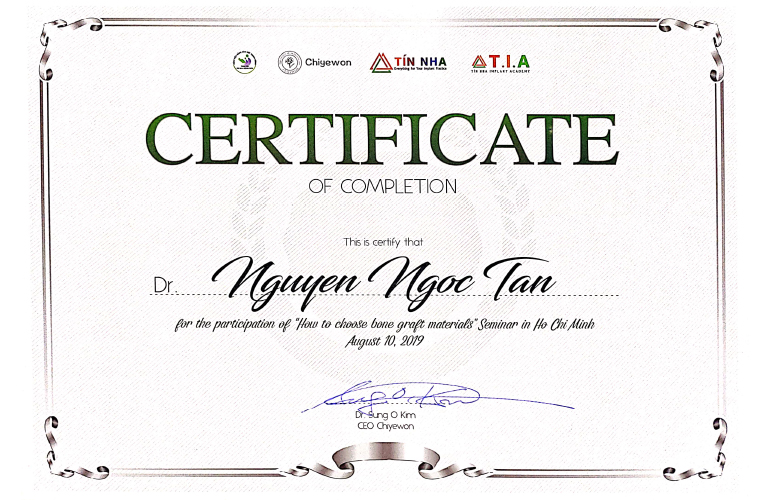

 Call
Call
SAIGON IMPLANT CENTER
Best dentist in Vietnam
Saigon Implant Center - Dental Clinic utilizes the latest technology for specialized treatment in the field of Single implant, full jaw implants, All on 4 implants, All on 6 implants, Zygoma implant....
SAIGON IMPLANT CENTER
Best dentist in Vietnam
Saigon Implant Center - Dental Clinic utilizes the latest technology for specialized treatment in the field of Single implant, full jaw implants, All on 4 implants, All on 6 implants, Zygoma implant....